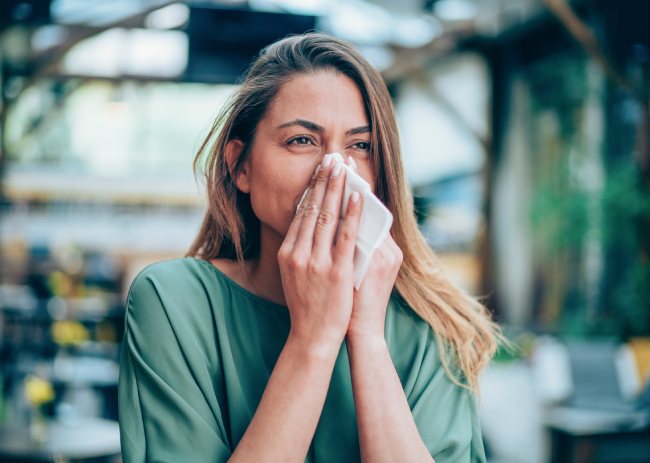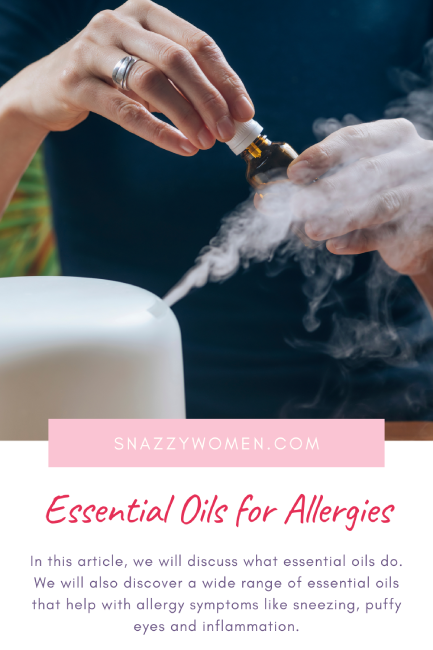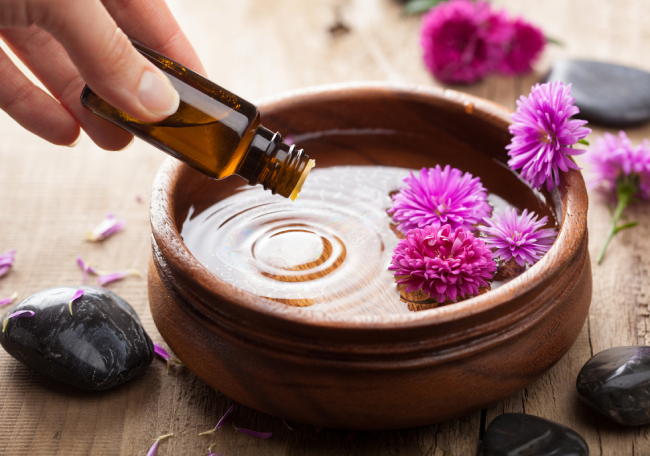Essential oils for allergies are a great alternative treatment for people with allergies.
These oils are usually taken from plants. You can use them in many different ways. Some ways to use essential oils are:
- A great way to use essential oils is by diffusing them.
- You can also dilute the oils with carrier oils like coconut oil. This can be applied to your sinuses, behind your ears, under your nose and on your neck and chest.
- Besides that, you can also add them to a neti pot in a saline solution.
- You may spray them in the air as well
- You could even try inhaling them directly from its container.
Another form of using these oils is through aromatherapy or aromatherapy massages. It is found that when you inhale any of these oils it affects your whole body.
Essential oils are a great way to combat stress. Many people have also turned to aromatherapy to help with puffy eyes, asthma, stuffy noses, headaches and many other symptoms that are related to seasonal allergies.
Essential oils are also safe and a natural way to relieve your symptoms. But it is not a cure for your allergies.
Now, if your symptoms are severe, you should check them out with a doctor. However, if you’re just looking for some relief, then essential oils will do the trick.
In this article, we will discuss what essential oils do. We will also discover a wide range of essential oils that help with allergy symptoms like sneezing, puffy eyes and inflammation. Besides that, you can also check out some amazing blends of essential oils. You can even read through the risks and benefits of these oils. Don’t forget to check out the best essential oil brands along with some useful tips.
Which Are The Best Essential Oils for Allergies?
There are some combinations of essential oils that can work to alleviate your allergy symptoms. They are listed below:
- Option 1: Put a drop of both lemon and chamomile essential oils on a tissue. You can then inhale the aroma. You can also use a combination of chamomile and lemon (2 drops each) along with a drop of lavender essential oil.
- Option 2: You can dilute 2 drops of chamomile, 1 drop of lemon and 1 drop of geranium essential oil in a teaspoon of carrier oil. Then use this dilute to massage your chest, back and neck.
- Option 3: Another option is to blend sandalwood, Ravensara and frankincense oils. This can help with year-round allergic rhinitis. This helps to unblock your nasal passages and reduce sneezing. Besides that, it also helps with itchy and runny noses. You can blend these oils with a carrier oil like sweet almond oil and apply them to your skin. This blend can also be diffused and inhaled.
- Option 4: You can combine peppermint oil with lemon and lavender essential oils. This creates a soothing and effective relief for your allergies.
- Option 5: For an easy breathing blend, you can go with these oils. It is a combo of Myrtle, Spruce, Peppermint, Pine, Ravintsara and Marjoram. Besides that, it also contains Eucalyptus Citriodora and Eucalyptus Radiata. This blend helps to break up any congestion you may have. It also unclogs your respiratory tract. It also helps to reduce sneezing or coughing and relieves your sinus areas.
- Option 6: This next blend contains a mixture of Cedarwood, black pepper, Frankincense, Lemon, Lavender and Roman Chamomile. This is diluted in coconut oil. If you’re experiencing trouble with breathing like panic attacks, anxiety, noise or overstimulation, you can use this blend.
7 Essential Oils for Seasonal Allergies

Here are some of the best essential oils that can help with seasonal allergies.
- Lavender: Essential oils like lavender are a great option to calm your nervous system. Besides that, lavender oil also helps to control your inflammation and reduces histamine. This means that it can provide great relief to someone with itchy and puffy eyes.
- Lemon: Next is lemon essential oil. This oil really helps to break up your mucus and also decreases the excess mucus that is produced. This works best for people suffering from stuffy noses.
- Eucalyptus: Another great tool to help clear and loosen the mucus production in your body is eucalyptus essential oil. Some studies have also shown that eucalyptus improves your airflow by stimulating the cold receptors in your nose.
- Tea Tree: This is a great oil that helps reduce your inflammation. It helps with puffy eyes. Besides that, it also has properties that are antimicrobial. This means that it repels any fungus, mold and bacteria that will exacerbate your allergies.
- Peppermint: Peppermint essential oil is a great option to help with pain relief. It helps to clear your airways and works as an antihistamine. This works best if you have a sinus headache.
- Frankincense: This next essential oil is great for inflammation and contains alpha-pinene which helps with asthma patients. It works to open up airways that are constricted.
- Sandalwood: Last on the list is Sandalwood essential oil. This oil helps to decrease the release of histamine in your body. Thus, it helps your body respond to allergens differently.
7 Essential Oils Good for Allergies
Here are some good essential oils that can help with your allergies.
- Thyme: Here is a great essential oil to help your breathing. Thyme essential oil seems to help with inflammation and also has antispasmodic properties. This makes it much easier for you to breathe if you’re feeling congested.
- Rosemary: Another good antihistamine and antispasmodic essential oil is rosemary. This is because it contains something called alpha-pinene. It also helps to reverse any airway obstruction like an asthma attack.
- Ravintsara: This essential oil is also known as Ho Leaf or Ho Wood. Ravintsara contains large amounts of cineole. This oil helps relieve sinus pains and loosens your mucus. Besides that, it also relieved you from headaches and reduces inflammation.
- Tamanu Oil: This oil has antibacterial and anti-inflammatory properties. This helps in treating rashes and inflammation.
- Roman Chamomile: Roman Chamomile helps to act as a relaxant and an anti-inflammatory. These are things that help people to breathe better if they have a constricted airway. Besides that, it also helps to provide relief to people with skin allergies like eczema reaction.
- Lime or Wild Orange: If you’re looking for an oil to remove bacteria and prevent its growth, these are great essential oils to keep on hand.
- Clove: This is a great essential oil that can boost your immune system and relieve you from headaches, congestion and muscle aches.
Benefits of Using Essential Oils for Allergies
There are various benefits to using essential oils for allergies. Here are some of them:
- Essential oils may soothe your allergic symptoms. It can also help keep you calm and decrease inflammation. Essential oils are also an excellent way to relieve stress.
- They can also improve your breathing and alleviate headaches, runny noses and puffy eyes.
- Some oils like eucalyptus give you a cool sensation that clears your breathing passages. They also help to treat some seasonal allergies.
- If you use an essential oil like lemon, you can clear your sinus areas and also decrease congestion.
- Some studies show that peppermint oil also helps to relax your muscle contractions. This helps with coughs.
- To relieve pain, inflammation, and discomfort you can go for peppermint, rosemary or cypress oil. Frankincense, geranium, cedarwood, or helichrysum oil are also some great options.
Uses and Associated Risks
There are various risks that come with using essential oils. You should make sure that you always use these oils are they are directed. Besides that, only buy good quality products.
- If you’re using essential oils for the first time, you may experience an allergic reaction to some of the. You should always do patch tests of any oils that you are using before applying them. Give them at least 24 hours to work.
- Always dilute your essential oils before applying them to your skin. You can use oils like coconut oil or sweet almond oil.
- Tea tree oil is also dangerous if ingested. Don’t swallow any essential oils. It can also trigger allergies.
- Eucalyptus also triggers some allergies.
- Be careful with these oils around young children and pregnant or nursing women.
- When you combine oils it can also increase the risk of more allergic reactions.
- Citrus oils can make you sensitive to the sun. Be careful not to expose your skin to tanning beds or to direct sunlight if you’re using lemon or any citrus-scented oils.
Tips for Using Essential Oils
It is important to make the best use of essential oils. This can be done by understanding the uses and properties of each oil. Every oil has different properties and no oil is equal to the other.
- There are many ways you can use essential oils. You may diffuse them or spray them in the air as a form of aromatherapy. Besides that, you can also use them in lotions as topical treatments.
- Always make sure you use carrier oils to dilute your essential oil. This is mainly if you’re applying them to your body. You can use neutral oils like jojoba oil, almond oil or coconut oil. Always make sure that you do a patch test before putting any blend or new oil on your skin.
- Pick your essential oil depending on what you need. For instance, you can choose a citrus scent for a mood booster. Or you could go for lavender to help you relax and eucalyptus to help with the pain.
- You can also identify virgin oils. These are extracted oils that have no additives or chemicals added. Oils that are steam extracted or through other techniques may irritate the skin.
- When treating seasonal allergies you can use oils like peppermint, eucalyptus, lemon and frankincense. You could also use lavender to help you sleep. Besides that, tea tree, lavender and chamomile are good options.
- To reduce swelling and increase circulation you can consider sandalwood or cypress oil. Besides that, juniper berries, frankincense and grapefruit also help. Ylang-ylang, lavender and chamomile oils also work wonders to help you relax and sleep better.
- To boost your energy and concentration you can choose peppermint, orange or spearmint oils. Grapefruit and lemon oils are also great options.
Top 4 Essential Oil Brands
If you’re looking for the top brands in essential oils, then you can check out these 4 of the best.
- Now Foods: Here you can get various kinds of essential oils. From sweet-scented and floral oils to musky or spicy oils. Besides that, there are some mint and woodsy-scented oils as well. You can also buy some essential oil diffusers.
- DoTerra: If you’re looking for single or blended oils, then this is the place to look at. You can get various blends meant for different purposes. There are respiratory blends and protective blends. Besides that, you can also get soothing and digestive blends.
- Thrive Market: Here you can shop for various different essential oil kits. You can also find some good aromatherapy blends. You could also go for a stone diffuser and an essential oil spray.
- Essence-Lux Oils: You can go for some soothing chamomile oil or sweet vanilla oil. Another popular scent is the rose essential oil and myrrh essential oil.
FAQs
What Essential Oil Helps Best With Allergies?
There are many popular essential oils that are being used. These include chamomile, lavender, lemon, geranium, ginger, bergamot, cedar wood, and tea tree. Since these aromatic oils are strong, you should dilute them in a neutral oil before you apply them to your skin. Some neutral carrier oils are jojoba oil, coconut oil, sweet almond oil, or olive oil.
There are some essential oil combinations that can help with allergy symptoms. They are as follows:
- Place a drop of lemon essential oil and a drop of chamomile essential oil on a tissue. The aroma can then be inhaled. You can also combine chamomile and lemon essential oils (2 drops each) with a drop of lavender essential oil.
- Dilute 2 drops of chamomile essential oil, 1 drop of lemon essential oil, and 1 drop of geranium essential oil in a teaspoon of carrier oil. Then massage your chest, back, and neck with this dilute.
- Combine sandalwood, Ravensara, and frankincense essential oils. This can help with allergic rhinitis all year. This helps to clear your nasal passages.
Where Do I Apply Essential Oils For Seasonal Allergies?
The first thing to do before applying essential oils to your body is to dilute the oils with carrier oils such as coconut oil, jojoba oil, or sweet almond oil. There are certain areas of your body that absorb these oils best for different purposes. They are listed below:
- For general allergies, you can apply them to your pulse points. This can be used on your sinuses, behind your ears, under your nose, neck, and chest.
- If you’re congested, you can apply it down the back of your spine as well as the upper chest, behind your ears and in your throat or neck.
- If you have a headache, apply it to your temple, inner wrists and the crown of your head.
- If you’d like to support your immune system then you can go for the spine, bottoms of your feet and over your heart.
How Can I Relieve Allergies Naturally?
The fragrance of essential oils travels to the limbic system of your brain during a massage. This adaptable framework performs many functions. For instance, it helps regulate your emotions. Nice aromas cause serotonin and dopamine to be released. Thus resulting in pleasant feelings.
You can try things like nasal saline irrigation for allergic rhinitis. Besides that, you should start using air filters. Bromelain and Butterbur are also excellent antihistamines. Something else you can try is acupuncture and stinging nettle. Honey is also something that works along with various essential oils for allergies like frankincense, eucalyptus and peppermint.
How Do You Apply Essential Oils For Allergies?
There are many different ways you can apply essential oils for allergies. These oils can be used in the following ways:
- Diffusing essential oils is an excellent way to use them.
- Dilute the oils with carrier oils such as coconut oil. This can be used on your sinuses, behind your ears, under your nose, neck, and chest.
- You can also use them in a neti pot with a saline solution.
- You can also spray them in the air.
- You could even inhale them straight from the container.
- Aromatherapy or aromatherapy massages are another way to use these oils. It has been discovered that inhaling any of these oils has an effect on your entire body.
What is a Natural Antihistamine?
Antihistamines are things that stop histamines from being active in our bodies. Histamine is something that can trigger typical allergy symptoms like sneezing, scratchy throats and itchy eyes. Here are some of the best natural antihistamines:
- Vitamin C: You can consume broccoli, bell peppers, strawberries and cantaloupe melon. Besides that, cauliflower, citrus fruits, and kiwi fruit are also some good natural antihistamines.
- Butterbur: This is extracted from a shrub found in Europe, Asia and some places in North America. It can help treat hay fever and migraines.
- Probiotics: These are microorganisms that help boost your immune system. They have many health benefits and keep your gut healthy.
In Conclusion
Essential oils for allergies are natural and fragrant ways to deal with the truckload of symptoms that come with allergies. Many people have also switched to aromatherapy to assist with puffiness, breathing problems, stuffy noses, headaches, and a variety of other seasonal allergy symptoms.
Essential oils are also a natural and safe method of relieving your symptoms. It is not, however, a remedy for your allergies. If your symptoms are severe, you should consult with a doctor. However, if you’re looking for temporary relief, essential oils will suffice.
Besides that, you can find many different fragrances and types of essential oils. These oils work differently for different ailments. Some examples of essentials oils for allergies are:
- By activating the cold receptors in your nose, eucalyptus essential oil improves airflow.
- Lavender oil also reduces histamine and helps to control inflammation. This means that it can offer significant relief to people who have scratchy and swollen eyes.
- Tea Tree oil helps to counteract any fungus, mould, or bacteria that may inflame your allergies.
- Roman Chamomile essential oil provides relief to people suffering from skin allergies such as eczema.
- Thyme essential oil helps clear your system if you feel congested. This makes it easier for you to breathe.
- Rosemary essential oil helps to remove anything that is obstructing your airway in the case of an asthma attack.
What are some of your favourite essential oils? How do you use natural remedies to help lessen your allergies? Let us know in the comments section below!





